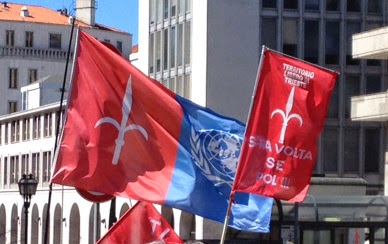
“Sta volta se pol” = “This time we can do it” in Triestin.
THE HEARING ABOUT THE NEW EXCEPTION OF THE LACK OF JURISDICTION
The Court of Trieste postpones once again the hearing about the exception of lack of jurisdiction. The hearing is very much awaited: it was to take place on 9 April, before judge Piero Leanza.
He is the same justice who, on 19 March, confirmed that the 1954 Memorandum of Understanding regarding the Free Territory of Trieste didn’t return Trieste to Italy. In his opinion, this occurred in 1977, under the bilateral Treaty of Osimo.
This time, it is easy understanding why Mr. Leanza postponed the hearing. Two days before, the defendants (I myself and Paolo G. Parovel, director of investigative newspaper “La Voce di Trieste”) lodged a significant addendum to exception of lack of jurisdiction: an analysis of his own March 19th ordinance about the question of the Free Territory of Trieste – FTT.
In this analysis we, as citizens of the FTT, questioned Mr. Leanza’s interpretation of the bilateral Osimo agreement. We did quoting several documents and laws in force, ultimately proving that Trieste has never returned to Italy.
Rhe present-day Free Territory of Trieste and its International Port are the same since 15 September 1947. They have the same legal status as declared by UNSC Resolution S/RES/16 (1947).
We did also mention confidential documents of the U.S. Department of State.
Ours is a very serious exception, considering its legal contents: it is something too complex to be evaluated just in the courtroom by the investigating magistrates. This is why the hearing is postponed.
Not to mention that, facing the Prosecution’s subtle request to dismiss the analysis “on sight”, for the first time, an Italian judge refused to do so. Instead, Mr. Leanza suggest the Public Prosecutor to read this document himself before the next hearing.
It is a procedure alike Anglo-Saxon justice: foreign judges do often recommend the parties to carefully evaluate each other’s documentation, especially new evidences.
Translated from blog “Ambiente e Legalità” – “Environment and Legality” by Roberto Giurastante
